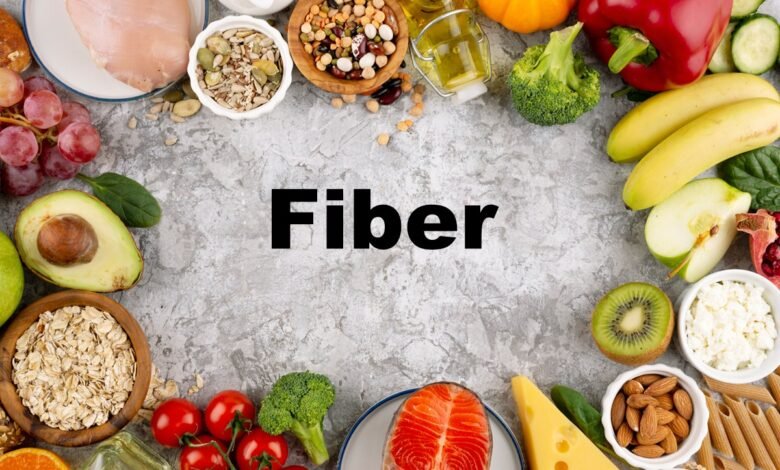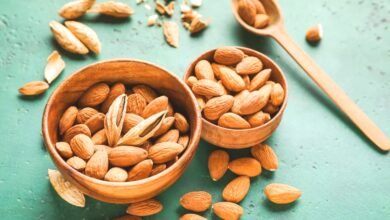Why Fiber is Crucial for Healthy Diet in 2023

 Over the past few years, the significance of adhering to a wholesome diet has become more prevalent, and people are adopting various techniques to ensure they consume a well-rounded and nourishing diet. A pivotal element of a healthy diet is fiber, which offers several health advantages such as better digestion, weight loss, and lower risk of chronic illnesses. Do you know why fiber is crucial for a healthy diet in 2023?
Over the past few years, the significance of adhering to a wholesome diet has become more prevalent, and people are adopting various techniques to ensure they consume a well-rounded and nourishing diet. A pivotal element of a healthy diet is fiber, which offers several health advantages such as better digestion, weight loss, and lower risk of chronic illnesses. Do you know why fiber is crucial for a healthy diet in 2023?
In recent years, the importance of maintaining a healthy diet has gained widespread attention, with individuals taking various measures to ensure they eat a balanced and nutritious diet. One crucial component of a healthy diet is fiber, which has numerous health benefits, including improved digestion, weight loss, and reduced risk of chronic diseases. In this article, we will explore why fiber is crucial for a healthy diet in 2023.
Read More: Balanced Diet is Important Of a Healthy Lifestyle.
What is Fiber?
Fiber is a type of carbohydrate that the body cannot digest, and it is found in plant-based foods such as fruits, vegetables, whole grains, legumes, and nuts. Unlike other carbohydrates that are broken down by the body, fiber moves through the digestive system mostly intact, adding bulk to stool and helping food move through the body.
Types of Fiber
Fiber is a type of carbohydrate that cannot be digested by the body. There are two main types of fiber: soluble fiber and insoluble fiber.
Soluble Fiber
Soluble fiber dissolves in water and forms a gel-like substance. It can be found in foods such as oat bran, beans, and fruits such as apples and strawberries. Soluble fiber helps to lower cholesterol levels and can also help regulate blood sugar levels.
Insoluble Fiber
Insoluble fiber does not dissolve in water and passes through the digestive system relatively intact. It can be found in foods such as whole grains, nuts, and vegetables such as broccoli and carrots. Insoluble fiber helps to promote regularity and can prevent constipation.
Both types of fiber are important for maintaining a healthy diet and should be consumed in adequate amounts. Most foods that are high in fiber contain a combination of both soluble and insoluble fiber.
Health Benefits of Fiber
Fiber offers a wide range of health benefits that make it an essential component of a healthy diet. Here are some of the benefits of fiber:
- Improved Digestion Fiber helps to promote regularity and prevents constipation by adding bulk to the stool. It also helps to prevent diverticulitis, a condition where small pockets in the colon become inflamed.
- Weight Loss Fiber can aid in weight loss by making you feel full for longer, reducing the likelihood of overeating, and regulating blood sugar levels.
- Reduced Risk of Chronic Diseases Fiber has been shown to lower the risk of chronic diseases such as heart disease, stroke, and type 2 diabetes. This is because fiber helps to lower cholesterol levels, regulate blood sugar levels, and reduce inflammation in the body.
- Improved Gut Health Fiber feeds the beneficial bacteria in the gut, which helps to maintain a healthy gut microbiome. This can reduce the risk of digestive disorders such as inflammatory bowel disease and irritable bowel syndrome.
- Lowered Risk of Cancer Fiber has been associated with a lower risk of certain types of cancer, including colorectal cancer. This is because fiber helps to keep the colon healthy and reduces inflammation in the body.
Consuming a diet high in fiber can provide numerous health benefits and is essential for maintaining good health.
How Much Fiber Should You Eat?
The amount of fiber you need to consume each day depends on your age, sex, and level of physical activity. According to the Institute of Medicine, the recommended daily intake of fiber is as follows:
- For men aged 50 years or younger: 38 grams per day
- For men aged 51 years or older: 30 grams per day
- For women aged 50 years or younger: 25 grams per day
- For women aged 51 years or older: 21 grams per day
It is important to note that these are general recommendations, and individual needs may vary. It is also important to gradually increase your fiber intake to avoid digestive discomfort. Drinking plenty of water can also help to prevent constipation and other digestive issues that may arise from consuming a high-fiber diet.
It is recommended to consume fiber from a variety of sources, including fruits, vegetables, whole grains, nuts, and seeds, to ensure you are getting a range of nutrients in addition to fiber.
Foods High in Fiber

Foods high in fiber are an essential part of a healthy diet. Here are some of the best sources of dietary fiber:
- Fruits: Apples, pears, bananas, oranges, strawberries, raspberries, and blackberries are all excellent sources of fiber.
- Vegetables: Broccoli, Brussels sprouts, carrots, sweet potatoes, peas, and artichokes are all high in fiber.
- Whole Grains: Whole wheat bread, brown rice, quinoa, oats, and barley are all excellent sources of fiber.
- Legumes: Lentils, black beans, kidney beans, chickpeas, and split peas are all high in fiber.
- Nuts and Seeds: Almonds, chia seeds, flaxseeds, and pumpkin seeds are all excellent sources of fiber.
Incorporating these foods into your diet can help to increase your fiber intake and provide a range of other essential nutrients. Eating a variety of high-fiber foods can also help to keep your meals interesting and flavorful. It is important to note that some foods may cause digestive discomfort in some people, so it is important to listen to your body and adjust your diet as necessary.
Fiber Supplements
While it is ideal to get fiber from whole foods, some people may struggle to get enough fiber from their diet alone. In such cases, fiber supplements can be a useful tool to increase daily fiber intake.
Fiber supplements come in various forms, including capsules, tablets, powders, and gummies. The two main types of fiber supplements are soluble and insoluble fiber. Soluble fiber supplements, such as psyllium husk, dissolve in water and form a gel-like substance in the digestive system, which can help to lower cholesterol levels and regulate blood sugar. Insoluble fiber supplements, such as wheat bran, do not dissolve in water and can help to promote regular bowel movements.
While fiber supplements can be beneficial, it is important to consult with a healthcare professional before adding them to your diet. Some people may experience digestive discomfort or interactions with certain medications. It is also important to follow the instructions on the supplement label and drink plenty of water to avoid digestive issues.
Conclusion
In conclusion, fiber is a crucial component of a healthy diet in 2023. It promotes healthy digestion, aids in weight loss, lowers cholesterol levels, and reduces the risk of chronic diseases. To ensure you are getting enough fiber, you should include more plant-based foods in your diet and speak to a healthcare professional before taking any fiber supplements.
Read More: 10 Proven Strategies to Optimize Your Health in 2023
FAQs
Q1. Can fiber cause constipation?
No, fiber can actually help to prevent constipation by adding bulk to stool and promoting regular bowel movements.
Q2. How can I increase my fiber intake?
You can increase your fiber intake by including more plant-based foods such as fruits, vegetables
Q3. Can fiber supplements replace fiber-rich foods?
While fiber supplements can be beneficial, it is always best to get your nutrients from food sources. Fiber-rich foods provide a range of other essential nutrients that supplements may not have.
Q4. Can fiber help with weight loss?
Yes, fiber can help with weight loss by making you feel full for longer and reducing the likelihood of overeating.
Q5. Can fiber be harmful?
While fiber is generally safe, consuming
Why Fiber is Crucial for Healthy Diet in 2023 Healthy Fiber






